Why It Matters
Carbon dioxide gas dissolves so readily in seawater that approximately one quarter of human caused CO₂ emissions become sequestered in the ocean. Once in the ocean, CO₂ combines with water to form a weak acid, resulting in a change in the chemistry of the sea.
The Chemistry of Ocean Acidification
The other major change in seawater chemistry involves CO₂-driven changes in the solubility of calcium carbonate minerals (CaCO₃) used by many marine plants and animals to build their shells and skeletons.rnrnThe solubility of CaCO₃ minerals depend on the amount of dissolved carbonate ions in seawater.rnrnMore CO₂ and lower pH reduces the concentration of carbonate ions, making it more difficult for many organisms to make shell material.

Ocean CO₂ and pH from NOAA: Correlation between rising levels of CO2 in the atmosphere at Mauna Loa with rising CO₂ levels in ocean at Station Aloha. As the CO₂ increases, the pH decreases; indicating increasing acidificication.

Ocean Acidification Threatens Shellfish Industries: Impacts on Wild Shellfish, Aquaculture, and Hatcheries
Acidified ocean waters can negatively affect wild shellfish stocks, as well as aquaculture, restoration, and hatchery industries. Adult shellfish become more susceptible to predators and disease as acidified conditions weaken shell strength and structure. Acidified conditions can also cause massive die-offs of juvenile shellfish that are reared in hatcheries and serve as the “seed” for many other aquaculture companies.
In 2007, the Whiskey Creek Shellfish Hatchery in Oregon experienced a massive die-off due to acidified conditions. Without access to healthy oyster seed, many shellfish growers were devastated for years. More acidified conditions cause adult shellfish to have weaker and thinner shells, making them more susceptible to predators and diseases. Hatcheries in the Gulf of Maine and the Mid-Atlantic are working with researchers to watch for changes and ward off massive die-offs like the one experienced at the Whiskey Creek Shellfish Hatchery.

Perspectives from the Commercial Shellfish Industry Webinar

These Effects Can Have Serious Economic Consequences
Working together with industry and resource managers, we can combine scientific expertise, real world experience, and resources to get results.
Similar collaborations in the Pacific Northwest have successfully passed new legislation, received funding, and acquired new data for acidification reduction efforts.
Mid-Atlantic research indicates there are reasons to be concerned about acidification and that the ocean chemistry is continuing to change, but we are still assessing the level of impact to be expected in this region and what that will mean for its coastal communities.

References
Get Involved
If you are interested in learning more about MACAN and the work we do, please sign up for our monthly newsletter. You can also read our 2024 to 2028 Work Plan.

The Mid-Atlantic Coastal Acidification Network. All Rights Reserved.